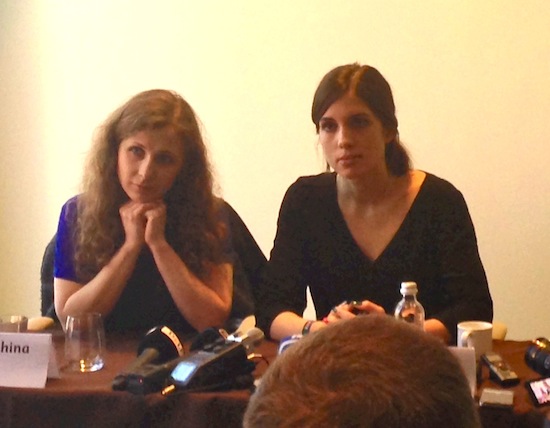The conference hall of the Hotel Nordic Forum was rammed to bursting this morning for the opening speeches of the Tallinn Music Week music conference. "I’ve never seen this event more busy," smiled Estonian president Toomas Hendrick Ilves in his traditional opening address, "and I think it’s not because of me."
He was referring to the imminent appearance of Nadezhda Tolokonnikova and Maria Alyokhina, two members of activist collective Pussy Riot, famously jailed for participating in the "Punk Prayer" protest performance in 2012. The two have since been released, a move they characterised as a publicity stunt for the international community ahead of the Sochi Winter Olympics. They’ve since become media figures whose steely refusal to be cowed by the Russian authorities has divided opinion in their homeland whilst capturing the imaginations of millions internationally.
Ilves gave a rousing speech, invoking everyone from Elvis to the Sex Pistols to Salman Rushdie as he described the role that the arts have to play in bringing about social change. As a former Soviet state, Estonia has learned to treasure this freedom more than most, with Ilves concluding that only societies that allow their artists free speech can expect to progress and develop.
Pussy Riot, of course, are not afforded such luxury. But after being released from prison in a pre-Olympics amnesty, which they characterised as a cynical publicity stunt, Tolokonnikova and Alyokhina immediately continued to loudly denounce the Putin regime regardless. A clip of them attempting to perform a new protest song at the Sochi Winter Olympics saw them brutally whipped by Cossacks and their instruments thrown into rubbish bins, with the resulting video footage immediately going viral.
"Our decision to perform at Sochi came unexpectedly," explained Tolokonnikova, perhaps the most famous member of the collective, after she defiantly raised a fist to TV crews upon her conviction. "We weren’t going to go. But on the first day of the Olympics some people from the gay and lesbian movement came to Red Square to sing protest songs and wave flags. They were immediately detained. Then there was a protest in Moscow against the closure of a TV channel, and they were also detained. We got very mad, and decided we had to get involved. We recorded the song ‘Putin Will Teach You How To Love The Motherland’ in one night, and the next morning we went to Sochi."
This kind of exposure has brought in offers from at least one industry figure at industry get-together Tallinn Music Week, who want Pussy Riot to form a "real band" and to tour and play at festivals – a notion they flatly reject.
"We started by playing illegal performances at unexpected places," said Tolokonnikova. "We try to explain that we have to do our thing in this way. Some people are fixed in their thinking on what bands should be, and they don’t understand why we are against it, but this kind of show goes against the foundation of what Pussy Riot is."
"The way we do it now, anyone can be Pussy Riot," remarked Alyokhina. "Anyone can put on the same accessories and do the same thing."
Since their imprisonment and release, the two now use their new-found status to campaign for prisoners rights, having been treated brutally during their incarceration, as well as continuing to offer unequivocal comment on Putin’s regime.
"We are going to talk to the European Parliament about sanctions against Russia," they said. "We support economic sanctions. It must be understood that this will hurt ordinary Russians, but maybe the couch is too comfortable under them right now. Something else needs to happen – rising prices caused by sanctions could cause people to come out in the streets and express their opinions."
For all the division amongst Russians about Pussy Riot, they characterise their work as pro-Russia, anti-Putin; a position that has struck a chord with many, both at home and abroad. "At Sochi," says Tolokonnikova, "after we were allowed to be free, the police just wanted to take selfies with us."
Perhaps Ilves’ remarks were indeed prescient and Pussy Riot’s voice and influence will prove cathartic for anti-Putin Russians who feel they have no voice. As long-time activist and radio DJ Artemy Troitsky stated whilst chairing the debate: "Marina Abramović may be more important to art history, but I think Pussy Riot will be more valuable to world history."


